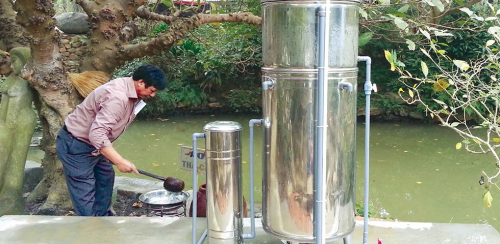
The University of Technology Sydney (UTS) team believe this technology could be adopted worldwide to improve water quality for more than 130 million people in the more than 70 countries experiencing toxicity from naturally occurring arsenic.
Sustainable
Professor Saravanamuth Vigneswaran and Dr Tien Vinh Nguyen at the UTS Faculty of Engineering received the Technology Against Poverty prize for their project to remove pollutants from groundwater in the Red River Delta of Vietnam.
This is a densely populated area where high levels of arsenic in the groundwater pose serious health risks.
UTS says current filtration systems are not cost-effective or efficient at removing arsenic. The reseachers claim theirs is the only sustainable system able to provide arsenic-free water and manage the arsenic residues produced during the filtration process. It is low-cost, easy to operate, built using locally-sourced materials and operates using renewable energy.
There are three key components:
- an organic membrane;
- a tank/drum in which the membrane is inserted; and
- an absorptive cartridge made from locally available industrial waste products.
Local manufacturers can produce, install and maintain the membranes and cartridges, creating local jobs.
The filtration can be powered by gravity, solar or by hand pump. Membranes last up to 3 years, while the cartridges absorb the arsenic and are replaced with new ones every 3-6 months. The waste cartridges will be turned into safe building materials, safely disposing of arsenic waste.
The filter also removes bacteria and solids from the contaminated groundwater, delivering water that is clean and safe to drink.
Scalable
The system is scalable. A 10 m3 system, for example, will provide uncontaminated water for 100 people.
The UTS team is working with Vietnamese partners on a local solution in an area of about 20 million people.
Technology Against Poverty is a partnership between the Australian Government’s innovationXchange and Google.org. The prize winner receives $500,000 to support work in improving the lives of people in the Indo-Pacific region through the innovative use of technology.





